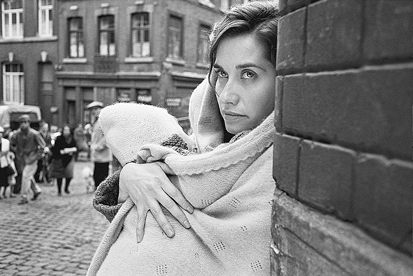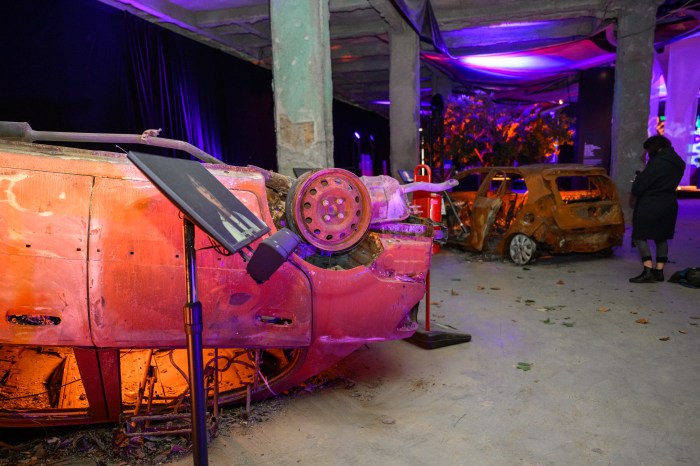Frédéric Fonteyne brings us a pre-feminist heroine who won’t let us in
Set in 1930s France and based on a novel by Belgian author Madeleine Bourdouxhe, “Gilles’ Wife” isn’t just a period piece. It feels like it was made in the past. Granted, there are a few modern touches—nearly abstract images under the opening credits, a sex scene in the first five minutes. However, its title heroine is a rather old-fashioned, pre-feminist character—woman as an inscrutable yet powerful enigma.
In fact, Simone de Beauvoir singled out Bourdouxhe’s protagonist in her book “The Second Sex” as an example of a woman completely under the sway of her husband. This notion seems to be shared by both the film and its characters. The French title translates literally as “the woman of Gilles,” alluding ambiguously to his infidelity, but making clear that her husband views her as a possession. She does have a name—Elisa—but it’s rarely spoken.
“Gilles’ Wife” takes place in a small mining town. Elisa (Emmanuelle Devos) is happily married to Gilles (Clovis Cornillac). The couple has two children, and Elisa is once again pregnant. Her sister Victorine (Laura Smet) often comes to see the children and help out with household chores.
Elisa’s contentment is broken when she starts to suspect that Gilles is cheating on her. She discovers that he’s having an affair with Victorine and tries to win back his affection.
Fonteyne and cinematographer Virginie Saint-Martin are talented enough to come up with plenty of striking images. “Gilles’ Wife” is filled with close-ups of Devos’ face, yet it punctuates them with long shots. They’re very carefully framed and lit. The lighting isn’t quite realistic, yet it’s not stylized enough to look outrageously artificial. In one shot, the camera lingers on the landing as she walks down a flight of stairs, baby in hand; in another, Gilles and Elisa’s house is shown from a distance, with a person barely visible in the kitchen. The scenes in the garden are particularly attractive, suggesting that it’s Elisa’s refuge from Gilles.
Film Comment magazine used to run a list of the “moments out of time” from the year’s films; “Gilles’ Wife” is designed as a string of them. Taken individually, they’re impressive, but there’s little cumulative effect. They don’t reveal much about Elisa’s character; their distance is implicit in the entire film. Fonteyne seems inspired by painting, especially Vermeer, but he doesn’t use it as a spur for cinema. “Gilles’ Wife,” which is filled with stationary shots, is too stately and sober for its own good. It’s beautiful in the least imaginative ways possible.
The influence of literature also hangs heavily over “Gilles’ Wife.” Although Bourdouxhe’s novel used flashbacks, Fonteyne avoids them. He also eschews voice-over. Elisa’s a remarkably quiet character, and her story is played out almost entirely in Devos’ facial expressions and body language. At first, it’s difficult to tell whether she’s passive or passive-aggressive.
On the surface, “Gilles’ Wife” seems like the kind of middlebrow literary adaptation that often attracts American distributors, but it’s too austere to be a crowd pleaser. A few recent French period pieces have shown how much life the form can still contain. Patrice Chéreau’s “Gabrielle,” which will be released next year, brings imaginative direction and an operatic flair for melodrama to the genre. Arnaud Desplechin’s 2000 “Esther Kahn” created an unforgettable character, embodied in a strange performance by Summer Phoenix; it’s hard to tell whether Kahn ends and Phoenix begins. If the past is a foreign country, Esther is unique enough to be a nation of one.
“Gilles’ Wife” feels like a synthesis of ‘50s French Tradition of Quality cinema and Rainer Werner Fassbinder’s ‘70s films about marital discord. As good as Devos is, she can’t quite carry the film, especially since Cornillac has little to offer except good looks; he certainly doesn’t pull off Gilles’ wild mood swings. The film avoids psychologizing its characters, but it fails to offer any alternate means of understanding them. Its dramatic momentum gets lost amidst a plethora of gorgeous but empty compositions. There’s a great amount of craft at work in “Gilles’ Wife,” but it never makes a satisfying whole.
gaycitynews.com


































